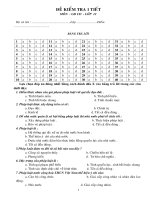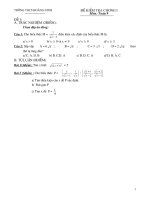Kiem tra 1 tiet
Bạn đang xem bản rút gọn của tài liệu. Xem và tải ngay bản đầy đủ của tài liệu tại đây (164.78 KB, 5 trang )
ENGLISH
9
I. Choose the word that has the underlined part pronounced differently from the
others:
1. A. climate
B. impress
C. primary
D. invite
2. A. design
B. depend C. religion
D. separate
II. Choose the word whose main stress is placed differently from the others :)
1. A. primary
B. interesting
C. together
D. tropical
2. A. convenient
B. encourage
C. material
D. modernize
III. Circle the letter A,B,C or D of the following sentences :
1. He ……………………. with his friends in an apartment since last week.
A. lives
B. lived
C. has lived
D. was living
2. Young people are fond of …………………….. jeans.
A. wear
B. wearing
C. wore
D. worn
3. They used to ……………………….. to school by bike.
A. go
B. went
C. gone
D. going
4. Ha Noi is not very different ……………………………. Kuala Lumpur.
A. in
B. at
C. to
D. from
5. The ……………………… language in Malaysia is Bahasa Malaysia.
A. nation
. national
C. nationally
D. nationality
6. Circle a mistake A, B, C or D in each sentence.
“Ao Dai” is the tradition dress of Vietnamese women.
A B
C
D
7. She wishes she ………………………….. a good student in her class.
A. is
B. was
C. were
D. would be
8. Have you ………………………. gone to the city ?
A. ever
B. for
C. just
D. already
9. We have lived in this town …………………… 1998.
A. for
B. in
C. since
D. ago
10. What did he --------- last week ?
A. do
B. did
C. does
D. doing
11. Nguyen Dinh Chieu is considered a famous Ben Tre’s ……………………. .
A. poet
B. poetry
C. poetic
D. poem
12. Uniforms should ------------- by students in schools.
A. wear
B. worn
C. be worn
D. wearing
IV. Read and complete the text, then answer True/False and answer the question below :
For centuries, poets, writers and musicians have ………………………. the ao dai in poems,
novels and songs. The ao dai is traditional ……………….. of Vietnamese women. It consists
……………..a long silk tunic that is ………………on the sides and worn over loose pants.
………….., it was frequently worn by both men and women. The design and ………………
used for men were different from those used for women. Nowadays, women usually wear it,
………….. on special occasions. However, many Vietnamese women today often prefer to wear
modern clothing ……….. work because it is more ………………..
* Answer True (T)/ False (F) :
1. The ao dai has been the subject of poems, novels and songs.
( )
2. The ao dai is the modern dress of Vietnamese people.
( )
3. Vietnamese people always wear ao dai.
( )
4. Many Vietnamese women today like wearing modern clothing at work. ( )
* Answer the questions :
1. Who used to wear the ao dai by tradition ?
à ………………………………………………….. .
2. When do women wear the ao dai nowadays ?
à …………………………………………………………………….. .
3. Why do Vietnamese women prefer to wear modern clothing at work?
à ............................................................................................................................ .
V. Rewrite the following sentences, beginning with the given words:
1. He often played the guitar at night.
àHe used to …………………………………................... .
2. She doesn’t have a pen pal.
à She wishes …………………………………................. .
3. You must do this test carefully.
à This test ……………………………………………….. .
4. People have built this school for 7 years.
-> This school ..................................................................... .
5. We have learnt English for 4 years.
à We started ………………………. ................................. .
6. I am not good at English.
à I wish ............................................................................. .
7. When did you buy this car ?
à How long ...................................................................... ?
8. My father don’t give up smoking .
I wish …………………………………………….
9.They are building a new house at the present .
A new house …………………………………………………..
DERIVATIVES or WORD FORMATION
1- a/ an/ the/ this/these/ those/ my ..their + Noun Phrase:
- Noun phrase có Noun là từ cuối cùng, trước nó là một hoặc vài Adj, trước
Adj là Adv.
Eg: This is a _______________ girl. (beauty)
Sau a là Noun Phrase với danh từ girl, trước đó sẽ là Adj.
This is his __________ organized room. (good)
Noun Phrase này có danh từ là room, organized là V3 cũng coi như Adj,
vậy từ trước đó sẽ là Adv.
2/ Prepositions + Noun Phrase:
Eg: He is fond of _____________ places. (peace) .
- Lưu ý đừng bị nhầm với mẫu của verb form (sau giới từ dùng Ving)
3/ Chủ ngữ (subject) hay tân ngữ (Object) = Noun Phrase.
Eg: She likes ________________ men. (care) .
_____________ driving always causes accidents. (care) .
Money can’t buy _______________ (happy).
4/ Linking verbs (be – look – seem – feel …) + Adj Phrase:
- Adj phrase có Adj ở vị trí cuối cùng, trước nó chỉ cịn Adv miêu tả cho Adj đó.
Eg: The city was _____________ destroyed. (complete).
She looks ____________ (wonder).
5/ S + V + O + ?:
- S + V + O + Adv: Adv miêu tả cho Verb
Eg: She drives the car ________________ (good).
- S + V + O + Adj: Adj miêu tả cho Object vốn dĩ là Noun
Eg: She found the test ________________ for her. (ease).
Đối với S V O ta phải dịch rồi mới làm.
6/ Intransitive verb + Adv:
- Intransitive verb (nội động từ) là những động từ khơng cần Object. Ví dụ: go
– walk – smile …
Eg: We walked _________________ (slow).
- Ngồi ra Adv có thể đứng trước Verb, giữa Auxiliary verb và Ordinary verb,
hoặc ngay đầu câu:
Eg: We ___________________ go out after dinner. (usual)
They can’t _____________________ get good marks. (frequent)
________________________, the Vietnamese celebrate Tet in late Jan or
early Feb. (tradition)
VI/ Practice:
1- We like their ___________________ (friendly).
2- The ________________ between Vietnam and China is good. (friend)
3- They seem to be ________________. We dislike them. (friend)
4- There will be a ___________________ in this street. (meet)
5- We saw ___________________ girls there. (beauty)
6- The garden is ________________ with trees and flowers. (beauty)
7- They enjoy the ___________________ atmosphere here. (peace)
8- The ___________________ unit of currency is the Ringit. (Malaysia)
9- In ___________________, there are other religions. (add)
10They like Pho Bo. ________________, they enjoy Bun Bo. (add)
11The ___________________ anthem of Viet Nam is sung. (nation)
12There is an ________________ match between Vietnam and
Lebanon on VTV3. (nation)
13The language of ___________________ is Bahasa Malaysia. (instruct)
14Ao Dai is the ___________________ dress of Vietnamese women.
(tradition)
15___________________, Ao Dai is worn by women. (tradition)
16To Huu is a famous___________________ (poetry). His
________________ are interesting.
17Ao Dai is always ___________________ (fashion)
18Jeans are ___________________ made from cotton. (complete)
19The ___________________ from Genoa enjoyed wearing jeans.
(work)
20___________________ of clothes always goes up. (sell)
21At the ___________________ to the village, we saw the accident.
(enter)
22They are ___________________ - qualified teachers. (good)
23We need further ___________________ (inform)
24This book is very ________________ (inform).
25We’re worried about the ___________________ here. (pollute)
26This river is extremely ___________________. (pollute)
27Watching Korean films on TV is a time-___________________ activity.
(consume)
28Tet is the most important ___________________ in Viet Nam.
(celebrate)
29He was very ____________ of the work he had done.
PRIDE
30. He is a strict _____________ (examine)
31I want to ______________ (attendance) at course
32This school has excellent _____________ (repute)
33We often take part in many ______________ (culture) activities
at school
34If you want to _____________ (improvement) your English, we
can help you
35Please phone this number for more ______________ (inform)
36I want to ______________ (advertisement) for selling my house
37. He is an _____________ (edition) of this newspaper
38This book is not _____________ (avail)
39He _____________ (exact) answered these questions
II/ / Put into indirect speech (đổi sang tường thuật)
1. He said to me, “I can't do this test”
→ He said to me _________________________________________________________
2. They said to him, “We’re learning English now”
→ They told him _________________________________________________________
3. She said to me, “I will go to China next week”
→ She said to me _________________________________________________________
4. They asked him, “Do you like to play this game?”
→ They asked him _________________________________________________________
5. He said to me, “I must finish these works on time”
→ He told me _____________________________________________________________
6. She asked me, “Why do you have to do this work?”
→ She asked me ___________________________________________________________
7. They asked him, “Shall we go to the stadium tomorrow?”
III/SENtence building
.I / wish / have / new friend / today
………………………………
2.He / used / play / football / when /he / ten
……………………………
3. Have / you / ever / visit / Dam Sen amusement
…………………
Q 2: Rewrite the following sentences without changing the meaning sentences
1. It’s a pity that you aren’t here now.
" I wish…………………………………………………..
2. They have build two departmentstores this year
"Two departmentstores………………………...
3. I often walked to school when I was six.
→ I used to…………………………………………..
4) I can’t speak English very well.
→ I wish.........................................................................................................................................
5) I’m sorry my father isn’t here now.
→ I wish
......................................................................................................................................................
6) I liked chocolate very much when I was a child.
→ I used.........................................................................................................................................
7) They have changed the traditional ao dai a lot since then.
→ The ...........................................................................................................................................
8) Laura hasn’t written to her mother for a month
→ Laura didn’t..............................................................................................................................
9/I am sorry I am busy now.
→ I wish..........................................................................................................................................
12/She doesn’t have a bike.
→ She wishes..................................................................................................................................
13/We played soccer in the afternoon long ago.
→ We used......................................................................................................................................
14/Mary and Tom invited three hundred people to the wedding.
→ Three...........................................................................................................................................
15/I last saw her 10 months ago.
→ I haven’t......................................................................................................................................









